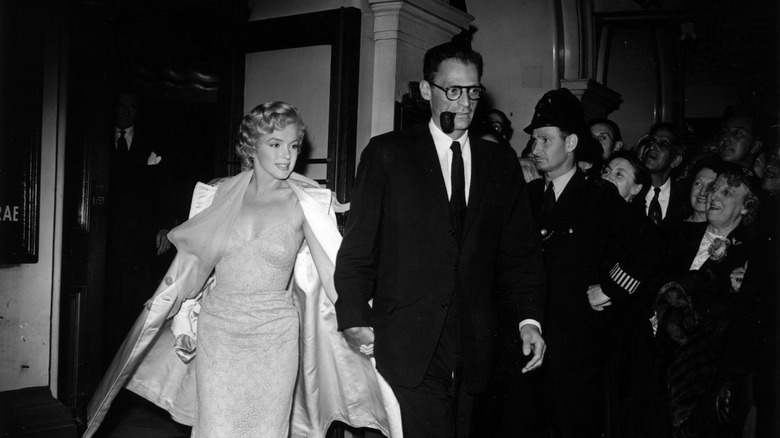Marilyn Monroe's Cause Of Death Explained
Marilyn Monroe was an American actress and model who was famous for being one of the most popular sex symbols of the 1950s and early 1960s. But behind the cameras was a difficult personal life that eventually led to her death at a young age. Here's what you need to know.
On August 5, 1962, Monroe was found dead in her home in Los Angeles, California (via The New York Times). She was 36 years old. According to The New York Times, 14 bottles of medicine were found on the nightstand next to her bed along with an empty bottle that had once held sleeping pills. Monroe had been prescribed the sleeping pills by a physician in addition to being treated by a psychoanalyst for a year. Monroe had called him that night to come to her home, but he suggested she take a drive instead.
A Los Angeles coroner determined that Monroe's death "was not a natural death" after performing an autopsy. After a short investigation, the Los Angeles police department stated her death was "caused by a self-administered overdose of sedative drugs and that the mode of death is probable suicide" (via History).
Monroe's life was rocked with challenges
Monroe was born Norma Jeane Mortenson on June 1, 1926, in Los Angeles. She spent much of her childhood in orphanages and foster homes (via Biography). She was sexually assaulted several times as a child and dropped out of high school when she was 15. A few years later she was discovered by a photographer and began a successful career as a model. She signed her first movie contract soon after, dyed her hair blonde, and began calling herself "Marilyn Monroe."
Throughout the 1950s, Monroe was one of Hollywood's most famous actresses. However, she suffered from severe anxiety that sometimes made her physically sick. Her love life also posed many challenges. In 1954, she married baseball legend Joe DiMaggio but the pair divorced eight months later. Two years later she married playwright Arthur Miller before getting divorced in 1961. Monroe suffered two miscarriages during their marriage.
Monroe's career began to decline during this time as well. Her last two movies, "Let's Make Love" (1960) and "The Misfits" (1961), written by her ex-husband Miller, did poorly at the box office. She reportedly had grown tired of the "dumb blonde" roles she was known for, but her attempt to progress into more serious roles wasn't going well.
Mental health struggles affected Monroe for most of her life
In addition to challenges in her career and love life, Monroe battled mental illness for many years. After seeing her mother spend a good portion of her life in mental institutions, Monroe voluntarily checked herself into a psychiatric clinic in 1961 (via Biography). She had a traumatizing experience but again sought the help of a psychiatrist the next year, who was in charge of her care when she died.
According to PBS, Monroe suffered from "severe mental health problems" including depression and likely bipolar disorder. She also struggled with substance abuse. At the time of her death, she was taking a variety of drugs in addition to the sleeping pills, a barbiturate called Nembutal, that were the cause of her overdose. At some time or another, she was taking other barbiturates, amphetamines, opiates, and sedatives. She also drank often.
Marilyn reportedly took Nembutal by opening the capsule first so that the drug would be more quickly absorbed into her bloodstream. Sometimes she would add another sedative and wash both down with alcohol. This particular mixture of drugs and alcohol increases the potency of the drugs and can cause memory loss that might lead to another dose being consumed not long after.
Sleeping pills can shut down bodily functions when taken incorrectly
According to Healthline, sedative drugs, including barbiturates, slow down your brain's activity to the central nervous system. As a result, you feel more relaxed and tired. Side effects of these drugs can include sleepiness, dizziness, blurred vision, trouble seeing, slow reflexes, slowed breathing, and trouble focusing. Long-term use of sedatives can lead to depression, anxiety, liver failure, and dependency. When you become dependent on a sedative, your body cannot function without it. People who become dependent on sleeping pills often cannot fall asleep without them.
Dependency can also lead to accidental overdose because someone might feel like they need to take far above the recommended dosage of a sedative to feel its effects. In the case of Monroe, who consumed an extremely large amount of Nembutal at once, overdose can also be an intentional form of suicide. According to Verywell Mind, taking too many sedatives can slow down the body's central nervous system to the point that other bodily functions slow down as well. This can lead to respiratory failure, unconsciousness, and death.
And if you or anyone you know is having suicidal thoughts, please call the National Suicide Prevention Lifeline at 1-800-273-TALK (8255).




